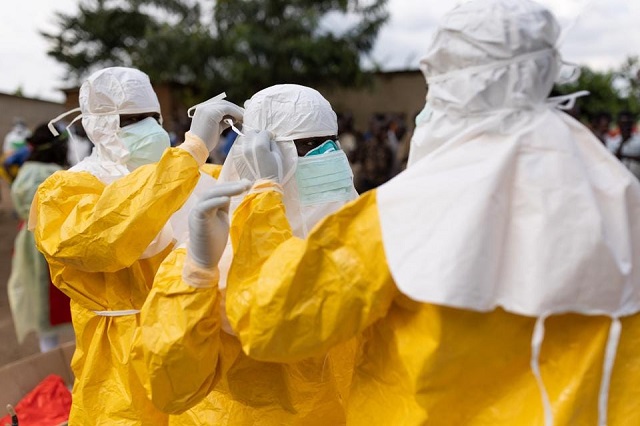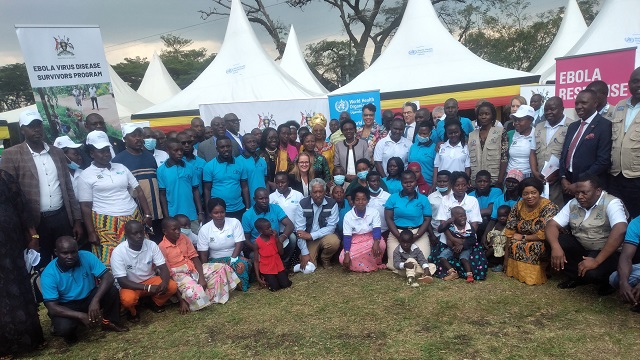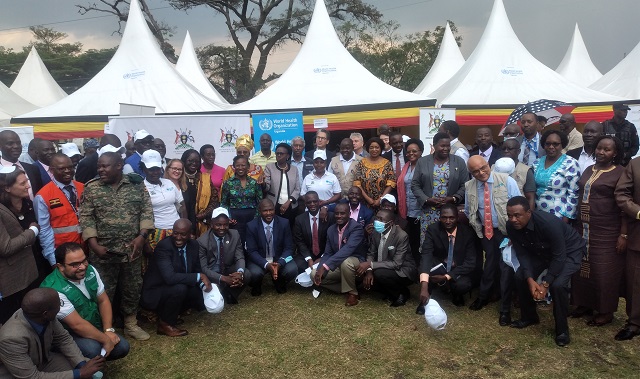
‘It’s the example that the African continent needs to follow’
COVER STORY | RONALD MUSOKE | Shortly after Dr. Jane Ruth Aceng, Uganda’s Minister of Health declared Uganda free from Ebola on Jan.11, her colleague, Dr. Ahmed Ogwell Ouma; the Acting Director General of the African Centres for Disease Control and Prevention, teased her telling her that he felt “both happy and sorry for Uganda.”
Dr. Ouma said he felt happy because Uganda had beaten Ebola but also felt sorry because Uganda had raised the bar so high for itself. “The next time a similar incident occurs, the international community will be expecting similar results,” he said.
Dr. Ouma said although it had taken 113 days for Uganda to be declared Ebola free, it had actually taken less than 70 days to bring the highly infectious disease under control. This, he said, was because it had taken 69 days from the time the first Ebola case was diagnosed at Mubende Regional Referral Hospital on Sept.19, last year, and the time the last case of Ebola was documented (Nov.30, 2022).
“It’s the example that we on the African continent need to follow when we are faced with similar health emergencies. It’s the example that we at Africa CDC are going to be using as we support other African countries in preparing to respond to various emergencies here on the continent.”
Uganda free from Ebola
In declaring Uganda free from one of the country’s most challenging Ebola outbreaks, Minister Aceng noted the country had spent two incubation cycles of 21 days each since the discharge of the last confirmed Ebola case on November 30, last year. The 42 days elapsed on Jan.10.
“Having registered no new Ebola case, despite sustained intense surveillance both at the epicentre district and nationally, I now confirm that all transmission chains have been fully interrupted and (I) take this opportunity to declare that the outbreak is over, and Uganda is now free of active Ebola transmission,” Dr. Jane Ruth Aceng said amidst applause from local, national and foreign dignitaries at the Mayor’s Gardens in Mubende Municipality.
According to the World Health Organisation (WHO),the Mubende outbreak was the country’s first Sudan ebolavirus outbreak in a decade and its fifth overall for this kind of Ebola. In total, there were 162 cases (142 confirmed and 22 probable), 55 confirmed deaths, leaving 87 recovered patients.
Dr Tedros Adhanom Ghebreyesus, the Director-General of the WHO was also quick to congratulate Uganda for its robust and comprehensive victory against Ebola.
“Uganda has shown that Ebola can be defeated when the whole system works together, from having an alert system in place, to finding and caring for people affected and their contacts, to gaining the full participation of affected communities in the response,” Dr. Ghebreyesus said via video link.
He added: “Lessons learned and the systems put in place for this outbreak will protect Ugandans and others in the years ahead.”
Dr. Matshidiso Moeti, the WHO Regional Director for Africa thanked President Yoweri Museveni for his political leadership which she said highlighted the critical importance of high level political engagement in epidemic and emergency preparedness and response.
“With no vaccines and therapeutics, this was one of the most challenging Ebola outbreaks in the past five years, but Uganda stayed the course and continuously fine-tuned its response,” Dr. Moeti said.
“Two months ago, it looked as if Ebola would cast a dark shadow over the country well into 2023, as the outbreak reached major cities such as Kampala and Jinja, but this win starts off the year on a note of great hope for Africa.”
Mubende outbreak
Uganda declared an outbreak of Ebola (Sudan type) on Sept.20 last year after a case was confirmed in a village in Madudu sub-county in Mubende District.
According to the Ministry of Health, the case was that of a 24-year old man who presented with several symptoms on Sept.11. The symptoms included high-grade fever, tonic convulsions, blood-stained vomit and diarrhoea, loss of appetite, pain while swallowing, chest pain, dry cough and bleeding in the eyes.
The young man had visited two private clinics, successively from Sept.11-15 without improvement. He was then referred to Mubende Regional Referral Hospital on Sept.15 where he was isolated as a suspected case of viral hemorrhagic fever.
A blood sample was collected on Sept.17 and sent to the Uganda Virus Research Institute (UVRI) in Entebbe where RT-PCR tests were conducted. The results returned positive on Sept. 19. The patient died on the same day.

Mubende which is about 150km to the west of Kampala and is along the busy “Northern Corridor” route which connects the Indian Ocean Kenyan port of Mombasa to the eastern Africa hinterland (Uganda, Rwanda, Burundi, eastern DR Congo and northern Tanzania) suddenly became the epicentre of the deadly disease as cases started rising steadily.
Besides the district being a source of agricultural produce and forest products, it also hosts several gold mines which have in recent years attracted miners and gold dealers from across Uganda and the neighbouring countries.
This perhaps explains why unlike the previous six Ebola outbreaks in the country, the Mubende episode threatened to ground the economy as cases started rising and spreading beyond the epicentre. By the end of November, the disease had spread to eight other districts including Kassanda, Kyegegwa, Kagadi, Bunyangabu, Wakiso, Jinja, Masaka and Kampala.
But the government’s quick response assisted by over 50 local and international partners helped Uganda control the disease. The World Health Organization (WHO), the Africa Centres of Disease Control and Prevention (Africa CDC) and other partners supported Ugandan health authorities from the outset of the outbreak by deploying experts, providing training in contact tracing, testing and patient care, as well as building isolation and treatment centres, and providing laboratory testing kits.
Thanks to this support, the processing time for Ebola samples dropped from a few days to just six hours. The WHO also helped protect frontline health workers by organizing a steady supply of personal protective equipment.
“Uganda put a swift end to the Ebola outbreak by ramping up key control measures such as surveillance, contact tracing and infection, prevention and control,” said Dr. Aceng.
“While we expanded our efforts to put a strong response in place across all nine affected districts, the magic bullet has been our communities who understood the importance of doing what was needed to end the outbreak, and took action.”
According to Dr. Ruth Aceng, close to US$81 million was mobilized by the international community although by the time the end of Ebola was made on Jan.11, about US$29 million had been spent.
Misinformation almost derailed Ebola fight
But even with the goodwill from the international community, there were times when the government appeared to be losing the battle against the disease owing to lack of cooperation from the public due to negative talk, myths and misconceptions about Ebola.
“Many of our communities are yet to understand the dangers posed by an Ebola epidemic and that it can devastate economies and kill an entire village,” Margaret Muhanga, the Minister of State in charge of Primary Health Care told Parliament on November 20, last year, while giving an update on Ebola in the country.
“The negative propaganda and politicizing of the epidemic makes communities undertake dangerous activities like running away to other districts to avoid being isolated.”
Bernard Bwambale, 28, a trained nurse from Kikandwa in Kilwana sub-county in Kassanda District is one of the Ebola survivors who attended the “End of Ebola” function in Mubende Municipality on Jan.11. He told The Independent how he got infected by a friend who actually died of the disease.
He recalled how he too had dismissed the government’s warning on Ebola but ended up battling the disease inside the Ebola Treatment Unit at Mubende Regional Referral Hospital.

In hindsight he wishes he not been as careless. “We all thought Madudu was too far from us and I fell for the narrative that this was another government scam of government officials wanting to “eat” money,” he told The Independent.
On Oct.15, during his third address on the Ebola situation, President Yoweri Museveni locked down Mubende and Kassanda districts for 21 days with movements in and out of the two districts prohibited.
Curfew was also instituted in the two districts starting from 7pm to 6am while public transport, private transport and boda boda (motorcycle taxis) were prohibited from movement although transit vehicles were allowed to cross.
President Museveni said the government had taken the drastic decision because people had become difficult, were lying to authorities, hijacking dead bodies and moving from district to district; including coming to Kampala. The deceit, Museveni said, had not changed and the risk of spreading Ebola to other parts of the country remained very high.
Weekly flea markets were suspended but gold mines remained open with school-going children also being allowed to continue to commute between their homes and schools if they were wearing school uniform.
Places of worship, entertainment centres such as bars, video halls and fitness centres were also temporarily shut down. All burial (Ebola related or not) were conducted by the government designated burial teams during this time. Samples were also taken from all dead bodies and tested for Ebola.
The President’s directive on restricted movement was based on optimizing control efforts in the same geographical area and minimising spread to other areas. “Ebola, as you know, is highly infectious and deadly; if not adequately controlled, Ebola may spread beyond Uganda,” he said.
Meanwhile, Museveni directed responsible government agencies to intensify public health awareness after fully understanding community issues, culture and tradition. The Ministry of Health also intensified surveillance and contact tracing in the two “ground zero” districts of Mubende and Kasanda to pick out all possible cases.
Museveni noted that these were all temporary measures to control the spread of Ebola. He promised that if all people cooperated with the authorities, the Ebola outbreak would be brought to an end in the shortest possible time. The lockdown of the two districts would continue until Dec.17 when President Museveni instructed the end of lockdown of the two districts.

Although many were worried that the capital city would be put under lockdown following the confirmation of two cases in one of the city’s boroughs, Museveni did not lock down Kampala. He explained that while two cases had tested positive in city hospitals, they had travelled from Mubende District and were to be regarded as cases from Mubende. He said contacts of these two cases and the risk of infection was in Mubende not Kampala.
Still, Museveni was always aware and feared that the penetration of Ebola in heavily populated areas like Kampala and Jinja would create a situation of rapid spread. Yet the government had to protect the national economy and locking down the capital and other large cities would have hurt the economy which was recovering two COVID-19-inspired lockdowns.
Preparing for next outbreak starts now
Going forward, although the Mubende outbreak has been declared over, the fact that Uganda is a hotspot for zoonotic diseases such as Ebola was not lost on health experts who warned of more future outbreaks.
Indeed, before last year’s Ebola outbreak in Mubende, there had been six outbreaks reported in Uganda since the turn of the millennium. The first ever reported outbreak occurred in the northern district of Gulu in 2000, followed by Bundibugyo (2007), Luweero (2011), Kibale (July 2012) and Luweero (November 2012). There was also a spillover from DR Congo reported in Kasese in June 2018.
Many experts are sure about the next outbreak. It is not a question of “If Ebola will strike but when it will do so,” one expert told The Independent. The World Health Organisation noted in a statement that health authorities will continue maintaining surveillance and will be ready to respond quickly to any flare-ups.
A follow-up programme has also been put in place to support survivors while neighbouring countries have been put on alert and are encouraged to continue strengthening their capacities to detect and respond to infectious disease outbreaks.
Dr. Aceng also noted Uganda’s intense surveillance will continues over the next 90 days. She added that the country will also continue with its research on vaccines, therapeutics, diagnostics, ecological studies and Ebolavirus disease risk mapping.
“Many people said we should prepare for the next outbreak; that is one of the preparations. We shall also focus on infection prevention and control in both public and private health facilities. This will be guided by the Ministry of Health,” she said.
“We want to carry out a nationwide assessment and find out where Uganda is in regards to infection prevention and control.”
Dr. Aceng added that, going forward, Uganda would also help in building the capacity within the East African Community regional bloc. She said training will be undertaken in the constructed Ebola Virus Disease units for all EAC countries with support from the development partners and the World Health Organization.
“We are specifically looking at the Ebola Treatment Unit at Mulago which is semi-permanent and was constructed with that in mind. There will also be capacity building for our health workers, region by region.”
Dr. Aceng further noted that the government would establish multi-disciplinary emergency clinical response teams to support the entire country whenever there is an outbreak.
“There will be support for the implementation of recovery plan to ensure better coordination as well as integration of lessons learned into the existing plans and frameworks,” she said, adding that, “There will also be support programmes for the national community health strategy for better health education and promotion which is our focus to ensure our communities are empowered and ready to respond at all times.”
“There will also be a strengthening of laboratory capacity especially the field laboratories by having mobile field vans for Ebola so that in future we don’t displace existing programmes such as what happened at Mubende Regional Referral Hospital where the entire HIV clinic was displaced. We want to ensure that this does not happen again,” she said.
 The Independent Uganda: You get the Truth we Pay the Price
The Independent Uganda: You get the Truth we Pay the Price


